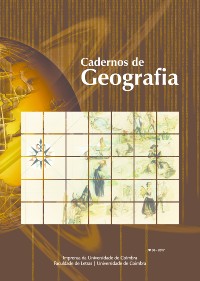Please use this identifier to cite or link to this item:
https://hdl.handle.net/10316.2/91156| Title: | Bases legais e institucionais de planos diretores municipais: exemplos no Triângulo Mineiro, Minas Gerais, Brasil | Other Titles: | Legal and institutional bases in municipal master plans: examples in the Triângulo Mineiro, Minas Gerais, Brazil | Authors: | Mauro, Cláudio Antonio Di | Keywords: | Brazil’ federal constitution;city statute;social function of property;democratic city;Constituição federal;estatuto da cidade;função social da propriedade;cidade democrática | Issue Date: | 2017 | Publisher: | Imprensa da Universidade de Coimbra | Abstract: | As questões urbanas, consideradas em sua complexidade, não se constituem em prioridades para as políticas
governamentais brasileiras. Ou são consideradas apenas em função de determinados aspectos que, em
ampla medida, não se orientam pelo que está dispo sto no Estatuto da Cidade. Mesmo que a Co nstituição Federal
da República Federativa do Brasil, bem como o Estatuto da Cidade s irvam de referenciais para as administrações
municipais na consideração da função social da cidade e também da propriedade urbana, ainda assim as políticas
aplicadas nos municípios têm se revelado deficientes. Os instrumentos contidos no Estatuto da Cidade,
mesmo quando incluídos em Leis Orgânicas de Municípios que elaboram seus Planos Diretores, contudo têm suas
utilizações precárias e não atendem os objetivos de garantir a cidade para todos. Os Planos Diretores de Uberlândia
e Tupaciguara (MG) são exemplos de iniciativas que apontam para aproveitamento adequado das normatizações
oferecidas pelo Estatuto, mas que, na pr ática, não foram complementadas por legislação regulamentar
e encontram-se sem aplicação em suas ricas possibilidades. Mesmo com a natureza progressista de novas práticas
possíveis do Estatuto da Cidade, chama muito a atenção o fato de que nos dois municípios importantes
instrumentos possibilitados pelo Estatuto da Cidade, e respaldados nos respectivos Planos Diretores, não terem
sido adotados de forma sistemática. IPTU progressivo, exigência do Estudo de Impacto de Vizinhança, Outorga
Onerosa, Uso capião Urbano, entre outros, embora sejam práticas legalmente respaldadas, demandadas nos dois
municípios, não se configuram como instrumentos efetivos para fazer cumprir a função social da propriedade
em prol dos interesses sociais coletivos. Revela-se que o instituído, mesmo quando regulamentado, só é transformador
em seu exercício efetivo. Explicita-se, então, a necessidade constante, sistemática e rigorosa da
efetiva participação na produção da cidade. Entretanto, se o que norteia é a cidadania, e esta se compõe de
deveres e direitos, reside aí um importante componente da cidade e da sociedade almejadas. E, principalme nte,
um avanço necessário na luta por uma cidade mais justa e democrática. The Urban issues, considered in their complexity, do not constitute priorities for Brazilian government policies. They are considered only in relation to certain aspects that, to a large scope, are not guided by what is laid out in the City Statute. Even though the Federal Constitution of the Brazil, as well as the City Statute provide references for municipal administrations in considering the social function of the city and the urban property, the policies applied in the municipalities have been deficien t. The tools contained in the Cit y Statute, even when included in Organic Law of Municipalities prepare their Master Plans, but have their uses precarious and do not meet the objectives of ensuring the city for everyone. The Masters Plans of Uberlândia and Tupaciguara Cities (MG/Brazil) are examples of initiatives that point to the proper use of the regulations offered by the Statute, but which in practice have not been complemented by regulatory legislation and are without application in their rich possibilities. Despite the progressive nature of possible new practices in the City Statute, it is very important to note that in the two municipalities important instruments made possible by the City Statute, and supported by the respective Master Plans, were not adopted systematically. Progressive IPTU, demand of the Neighborhood Impact Study, Onerous Granting, Urban Usucaption, among others, although they are legally supported practices, demanded in the two municipalities, are not configured as effective instruments to enforce the social function of property in the social collective interests. It’s clear that the instituted, even when regulated, is only transformative in its eff ective exercise. The constant, systematic and rigo rous need for effective participation in the production of the city is explained. However, if what guides is the citizenship, composed of duties and rights, we have an important component of the city and the desired society. Above all, a necessary advance in the struggle for a more just and democratic city. |
URI: | https://hdl.handle.net/10316.2/43408 | ISSN: | 0871-1623 2183-4016 (PDF) |
DOI: | 10.14195/0871-1623_36_4 | Rights: | open access |
| Appears in Collections: | Cadernos de Geografia |
Files in This Item:
| File | Description | Size | Format | |
|---|---|---|---|---|
| 4._cla_udio_di_mauro_e_gla_ussia_gomes_47-62.pdf | 2.35 MB | Adobe PDF |  |
Items in DSpace are protected by copyright, with all rights reserved, unless otherwise indicated.
